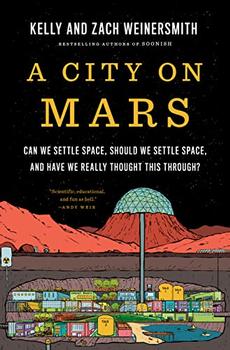Summary | Excerpt | Reviews | Beyond the book | Read-Alikes | Genres & Themes | Author Bio

Can We Settle Space, Should We Settle Space, and Have We Really Thought This Through?
by Kelly Weinersmith, Zach WeinersmithScientist Kelly Weinersmith and her husband, cartoonist Zach Weinersmith—self-described "space geeks"—spent four years researching the practicalities of human settlement on Mars. The result of their efforts is the wonderfully informative and entertaining A City on Mars: Can We Settle Space, Should We Settle Space, and Have We Really Thought This Through?
The couple went into the project believing, as many of us do, that space colonization will happen in the next few decades. The more they delved into the topic, however, the more they realized that space settlement's enormous technological, political and ethical challenges are nowhere close to being resolved. They speculate the timeline for space colonization is centuries, not decades.
The authors go on to outline many of the obstacles to establishing a successful settlement, why each is important to consider, and how few have been studied. No one knows if humans can successfully conceive and carry a pregnancy to term in space, for example—something that will need to happen for any colony to be self-sustaining. Another huge issue is the fact that space laws (outlined primarily in the Outer Space Treaty signed in 1967) are hopelessly vague and outdated, codified when there were only two space-capable nations and before commercialized space flight became a reality. The authors imagine several frighteningly plausible situations where conflict over territory on the Moon or Mars could result in war here on Earth. These are but two of the myriad factors that must be considered before humanity can move off-world.
Reading the book is like sitting through your favorite college professor's lecture series. The Weinersmiths approach this immensely complex topic in a clear, organized manner, yet relay it in such a conversational tone that one envisions being in the room with them. Their sense of humor, too, shines through in nearly every paragraph:
An Earth with climate change and nuclear war and, like, zombies and werewolves is still a way better place than Mars. Staying alive on Earth requires fire and a pointy stick. Staying alive in space will require all sorts of high-tech gadgets we can barely manufacture on Earth.
One might be tempted to dismiss A City on Mars as mere pop science—and indeed, the book's casual tone and cartoonish illustrations make it clear this is geared toward the layperson. Despite its humor and accessibility, however, the narrative is surprisingly rich in data, making it denser than many modern pop-science works. Although the Weinersmiths do occasionally get lost in the weeds, in general the text moves along at a good clip, aided by the authors' relaxed tone and by the fact that the material is absolutely fascinating.
My only complaint is that as a fellow space geek, I was disappointed in the authors' conclusion that there's really no good reason to colonize space in our lifetimes, and, in fact, doing so would be an ill-advised experiment that could lead to great harm. They admit to being disappointed by their own findings: "Look, we're nerds," they write, "But we just cannot convince ourselves that the usual arguments for space settlements are good." Although I'm not sure I completely agree with their rationale—humans are remarkably resourceful creatures, after all—I very much appreciate their realistic approach to the subject, and I feel much better informed about the hurdles humanity will need to overcome to transform space settlement from the stuff of science fiction to reality.
A City on Mars is very accessible and highly entertaining, and I heartily recommend it to most audiences. Book groups with a scientific bent may want to add this one to their reading lists, perhaps in conjunction with one of the many science fiction novels set on Mars (see Beyond the Book).
![]() This review
first ran in the November 15, 2023
issue of BookBrowse Recommends.
This review
first ran in the November 15, 2023
issue of BookBrowse Recommends.

If you liked A City on Mars, try these:

by Lisa Kaltenegger
Published 2025
Riveting and timely, a look at the research that is transforming our understanding of the cosmos in the quest to discover whether we are alone.

by Samantha Harvey
Published 2024
A slender novel of epic power, Orbital deftly snapshots one day in the lives of six women and men hurtling through space - not towards the moon or the vast unknown, but around our planet.
Your guide toexceptional books
BookBrowse seeks out and recommends the best in contemporary fiction and nonfiction—books that not only engage and entertain but also deepen our understanding of ourselves and the world around us.